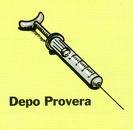|
|
LATE PERIOD – Is it a common thing for youth? Is it a big problem? Could it be a symptom of some diseases? Is late period always a signal for unexpected pregnancy?
All above mentioned questions are asked every day by millions of teens and women. And most of them don’t know the correct answer.
Although, pregnancy is the most common cause of late period and/or absence of menstruation (amenorrhea) – very often there are several reasons for late periods. So, what else can cause late period and/or the absence of menstruation?
There are various reasons for your period to be late and the pregnancy test to be negative. There are many possibilities for explaining delayed period. In most women of reproductive age, pregnancy is the first guess.
|
If your pregnancy test is negative and if you checked all possible reasons for false pregnancy test - you are sure that you are not pregnant, here are some other causes for late period that you could consider:
 |
Puberty
If you start you periods recently (during first year), late period and/or irregular periods are very common. Don’t worry and just be patient – your body needs some time for full development of the mature menstrual cycles.
|
 |
Stress
Stress can be the main cause of late period. If you are experiencing the dramatic stressful situation in your life, be aware that emotional stress can be a reason for late period. Stress can interfere with the normal hormonal signals from your brain, can change your hormonal status, can block your ovulation and delay your period. This could cause your periods irregular and you would have late period. Major changes in your life such as a new job, sudden massive workload, bereavement, can also create enough stress for late period. Eliminating the stress usually will cause menstruation to resume. |
 |
Hormonal Dysfunctions
Women hormones are very sensitive to many factors and hormonal dysfunctions are very common reason for late period. You could have a hormonal imbalance – for example, Polycystic Ovarian Syndrome (PCOS) is a common form of hormonal imbalance and late period is a common symptom for PCOS.
|
 |
Thyroid Problems
Thyroid hormones are playing an important role in menstrual cycle and regular periods. Thyroid problems also, again by interfering with the normal hormonal pathways, can lead to a late period. Better check your thyroid - millions of women suffer from undiagnosed thyroid disease which could be the main cause for late period.
|
|
|
|
|
 |
 |
Premature Ovarian Failure
In many women so called “premature menopause” is starting from late period. The term premature ovarian failure describes a stop in the normal functioning of the ovaries in a woman younger than age 40. Late period and absence of periods are common symptoms for premature ovarian failure. Better check all other typical symptoms for premature ovarian failure. |
 |
Hormonal Contraception
Some types of hormonal contraception are well known for side effects including late period. Most typical late period can be for Depo-Provera users.
If you are on birth control pills, you also could have late period (as a side effect).
|
 |
Serious illness
Any serious illness could be a reason for late period, especially if the illness is affecting your reproductive organs or their hormones - such as tumors in the brain (pituitary gland) as well as any serious illnesses of ovaries. Particular ovary conditions include ovary damage, autoimmune ovary disorder and Turner's Syndrome. |
 |
Nutrition
Do you eat a healthy, well-balanced diet? Women who are malnourished or extremely underweight often experience amenorrhea. This occurs often in women with eating disorders such as anorexia or bulimia.
|
 |
Weight Problems
Being overweight or underweight can also interfere with your normal menstrual cycle - rapid weight gain or loss can cause late period. In particular amenorrhea is associated with malnutrition or low body fat caused by eating disorders. Overweight women also can experience late period.
|
 |
Medication
Certain medications such as contraceptives (oral, implanted, and injected), oral corticosteroids, antidepressants, antipsychotics, thyroid, and some chemotherapy drugs, radiation therapy may cause late period.
|
 |
|
 |
Chronic Diseases
Do you have a chronic illness? If you have a chronic illness, or have been sick for an extended period, your menstrual cycle may be temporarily delayed. Chronic diseases could be a main reason for late period. Once your body is well your period will usually return.
|
 |
Intensive Sport
Fitness and sport both are becoming a part of modern life. How much do you workout? Do you dance or engage in sports? Vigorous exercise or athletic training can cause late period. Too much exercise, often connected with heavy dieting, can also be a reason for late period. Remember – regular normal periods are your body signals for health but late period is a signal for body disturbances.
|
 |
Breastfeeding
Breastfeeding mothers will often experience late period or absence of periods (amenorrhea). However ovulation may still occur and pregnancy is possible even without menstruation. |
 |
Smoking
In some cases heavy smoking can also be the cause of late period and/or absence of periods (amenorrhea). Smoking harms reproductive health including ovarian hormones - smoking affects ovarian function and decreases the female hormone estrogen which is responsible for regular periods. So late period could be a signal for nicotine addiction.
|
 |
Mental Health
Mental health and emotional disorders could be a reason for late period. For example, depression and pseudocyesis, which is a condition where a woman convinces herself that she is pregnant when she isn't (called “False Pregnancy”). The psychological effect is so strong that her periods may actually stop or she could have pretty late period.
|
 |
Tumors
Although rare, a pituitary tumor (a usually benign tumor) can cause an overproduction of prolactin which can interfere with the regulation of your menstrual cycle. Check hyperprolactinemia on next page.
|
How to check and be sure about late period?
 |
You can make the pregnancy test (available in all pharmacies with detailed instructions). But before buying it is recommended to check the accuracy of the test (you can ask the provider or check in instruction of the test). Different tests have different accuracies (from 70% to 95%);
|
 |
You can check your basal temperature (early morning before waking up from the bed). If the temperature is higher than 37.1-37.2 – it could mean pregnancy (50% accuracy);
|
 |
You can go to the doctor for ultrasound test (85%-95% accuracy).
|
|